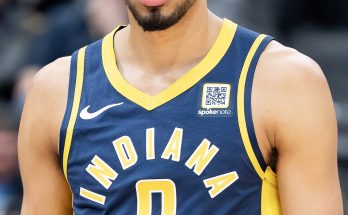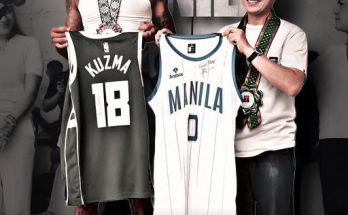Bleacher Report recently made waves in the NBA community by naming the Miami Heat as one of four potential landing spots for veteran guard Russell Westbrook in free agency. The discussion around Westbrook, a former MVP and one of the most explosive and dynamic point guards in recent NBA history, has been a topic of speculation for months. After years of inconsistency and frequent team changes, Westbrook’s next move carries significant weight, not just for his career, but also for the teams considering taking a chance on him. The Miami Heat, known for their strategic decision-making and ability to maximize veteran talent, could represent a unique opportunity for Westbrook to reinvent himself in a system that emphasizes accountability, defense, and efficiency.
Westbrook’s career has been defined by high energy, relentless athleticism, and an insatiable desire to impact every facet of the game. He has been a triple-double machine, an MVP, and a perennial All-Star, but his recent seasons have been marked by struggles with fit, efficiency, and adapting to team-oriented systems. Critics often cite his turnover rate, shooting inconsistencies, and defensive lapses as reasons for skepticism about his ability to contribute meaningfully on contending teams. Nevertheless, Westbrook’s talent and experience cannot be dismissed. His ability to attack the rim, create opportunities for teammates, and bring leadership and intensity to a locker room are qualities that some teams may view as essential for playoff success. The Miami Heat, in particular, have a history of turning perceived risks into advantages, and Westbrook could fit into their blueprint in a surprisingly complementary way.
The Miami Heat under Pat Riley’s leadership have consistently found ways to leverage veteran talent effectively. The Heat are a franchise renowned for extracting maximum effort from players who may have struggled elsewhere. From the experiences of veterans like Udonis Haslem, Andre Iguodala, and even Kyle Lowry in recent seasons, the organization has shown an uncanny ability to integrate high-profile names without disrupting team chemistry. Westbrook, with his hunger and competitive fire, could thrive in an environment that demands accountability and emphasizes defensive effort, hustle, and team-first mentality. The Heat’s culture is structured around discipline and hard work, and Westbrook’s intensity could mesh with a system that values mental toughness and competitiveness, provided he is willing to adapt to a role that is potentially more limited than what he has played in the past.
From a strategic standpoint, Miami’s roster construction could make Westbrook an intriguing fit. The Heat have several wings and big men who excel in spacing, cutting, and floor movement. A player of Westbrook’s caliber, who thrives in transition and can push the pace, might find opportunities to impact the game without needing to dominate the ball in half-court sets. Jimmy Butler remains the centerpiece of the team, and Bam Adebayo continues to provide elite interior presence, but there is room for a guard who can bring energy, drive, and playmaking off the ball. Westbrook has shown in past seasons that when his scoring burden is reduced and his role is clearly defined, he can still be an elite contributor. In Miami, he might find a scenario where his strengths are amplified, and his weaknesses are mitigated.
There are, however, clear challenges that come with acquiring a player like Westbrook. He has a career reputation for being difficult to integrate into established systems due to his ball-dominant style. His shooting efficiency, especially from three-point range, has been inconsistent throughout his career. To thrive in Miami, Westbrook would need to accept adjustments in his role, embrace off-ball movement, and focus on high-efficiency scoring opportunities. The Heat have had success in transforming players’ games, such as turning Jimmy Butler into a premier two-way star, and it is possible that similar guidance could help Westbrook adapt to a more complementary role. Pat Riley and Erik Spoelstra have a track record of motivating players to embrace selflessness and prioritize winning over individual stats, and that leadership could be crucial for Westbrook’s resurgence.
Financially, the Heat may also view Westbrook as a calculated risk. Westbrook’s contract demands could be structured in ways that allow the Heat to maintain flexibility while adding a player with championship-level experience. Miami has demonstrated a willingness to use the salary cap creatively, maximizing the impact of high-profile signings while maintaining depth across the roster. Westbrook’s presence could provide insurance for playoff runs, offering a guard capable of producing in multiple ways against top-tier competition. Even if he does not return to his MVP form, Westbrook could bring valuable minutes, leadership, and a scoring punch off the bench or as part of a rotation that complements the Heat’s existing stars.
Another consideration is the mentorship aspect Westbrook could provide. The Heat have several young and developing players who could benefit from his experience and knowledge of the game. From teaching the nuances of attacking defenses to sharing insights on maintaining peak physical conditioning and mental toughness, Westbrook could influence Miami beyond his on-court contributions. The Heat organization places a premium on player development, and integrating a veteran like Westbrook might accelerate the growth of younger guards or wings who are learning to navigate high-pressure situations. His presence could also serve as a motivational catalyst, reinforcing the competitive culture that has defined the Heat for decades.
While the Heat’s interest remains speculative at this stage, the scenario presents several intriguing narratives. Westbrook could attempt to reinvigorate his career in a system that prizes discipline and effort, while Miami could potentially gain a high-upside player who, if managed correctly, could significantly enhance their playoff prospects. The fit is far from guaranteed, but the conceptual alignment is compelling. The Heat are accustomed to winning with precision and effort, and Westbrook is accustomed to competing at the highest levels with relentless energy. If both sides can find common ground in expectations, minutes, and role definition, the partnership could be mutually beneficial.
Additionally, Miami’s coaching staff has historically been adept at integrating players with unique skill sets into their rotations. Spoelstra’s experience with versatile guards and wings suggests he could devise schemes to exploit Westbrook’s speed, finishing ability, and playmaking instincts while shielding the team from his inefficiencies. The Heat’s defensive schemes emphasize communication, rotation, and accountability, which could either highlight Westbrook’s strengths or expose him if he fails to adhere to structure. It would require a commitment from both the player and the coaching staff to make the fit successful.
Looking at the broader landscape of free agency, Westbrook has options, but not every team may be willing to take on the challenges associated with his style of play. This is why the Heat, with their culture, strategic mindset, and history of developing veteran talent, emerge as a compelling candidate. The organization has repeatedly demonstrated that it can extract maximum value from players who may have struggled elsewhere, turning skepticism into championship-caliber performance. For Westbrook, a move to Miami could represent not only a fresh start but also a chance to contribute meaningfully in high-stakes situations.
Critics may argue that Westbrook’s best days are behind him and that the Heat should avoid taking on a high-profile risk. However, history shows that the Heat have often benefited from calculated risks, whether in acquiring players like Jimmy Butler, Goran Dragic, or veteran role players who have helped secure playoff success. The organization’s ability to balance veteran presence with emerging talent has been a hallmark of its sustained competitiveness. In this context, Westbrook could be viewed not as a gamble but as an opportunity to harness untapped potential within a structured, disciplined environment.
It is also important to consider Westbrook’s personal motivations. After a career filled with personal accolades and a relentless pursuit of individual milestones, he may be seeking a situation where winning and legacy take precedence over stats. Miami, with its championship pedigree and history of playoff success, offers an attractive destination for a player seeking redemption, stability, and a chance to compete for a title. The Heat’s culture emphasizes buy-in, toughness, and team-first mentality, which could align with Westbrook’s desire to solidify his legacy and leave a lasting impact in the final chapters of his career.
Ultimately, the idea of Russell Westbrook joining the Miami Heat represents a fascinating convergence of opportunity, risk, and potential reward. For the Heat, it could mean adding a player with championship experience, explosive athleticism, and high-level playmaking ability. For Westbrook, it could mean finding a system and culture that maximizes his strengths while mitigating his weaknesses, potentially redefining his role and reinvigorating his career. The Heat’s track record with veteran acquisitions, combined with Spoelstra’s coaching acumen and Riley’s strategic foresight, makes the scenario plausible and worth watching.
As free agency approaches, the NBA landscape will continue to shift, and speculation about Westbrook’s next team will intensify. Whether Miami ultimately becomes his landing spot remains uncertain, but the discussion highlights the intriguing dynamics between player fit, organizational culture, and strategic planning in professional basketball. Westbrook’s potential move to Miami is more than just a transaction; it represents a potential reinvention, a test of adaptability, and a case study in how the right environment can transform a player’s trajectory. In the end, if the Heat and Westbrook can align their goals, expectations, and roles, it could become one of the more compelling storylines of the upcoming NBA season, blending legacy, opportunity, and the pursuit of championship success in a single, high-stakes narrative.
The conversation surrounding Russell Westbrook and the Miami Heat underscores the complex calculus teams face in free agency. It is about more than talent; it is about culture, leadership, fit, and the ability to translate individual skill into collective success. For a franchise like Miami, known for making bold yet calculated moves, Westbrook could be a puzzle piece that completes the picture of a championship contender, provided the integration is handled with precision and care. The potential partnership is not without challenges, but the upside is tantalizing—a former MVP in a system designed to optimize performance, surrounded by competitive veterans, with the guidance of one of the NBA’s most respected coaches. It is a storyline that promises drama, intrigue, and the possibility of resurgence for both player and team alike.
In conclusion, Bleacher Report’s designation of the Miami Heat as a potential landing spot for Russell Westbrook is more than mere speculation. It is a reflection of a broader understanding of fit, culture, and the strategic thinking that drives successful NBA franchises. While there are undeniable challenges, the alignment between Westbrook’s competitive fire and Miami’s disciplined, winning-focused environment makes this scenario worth watching closely. For Westbrook, it could be a chance to reassert his relevance and chase a championship in a structured and demanding setting. For the Heat, it could mean adding a high-risk, high-reward talent capable of elevating the team’s playoff aspirations. The intersection of these two forces—Westbrook’s desire for redemption and Miami’s knack for maximizing veteran impact—creates a compelling narrative that could shape the NBA landscape in the seasons to come.
This analysis of Westbrook and Miami illustrates the ongoing complexities of player movement, team culture, and the pursuit of competitive advantage in the modern NBA. While the outcome remains uncertain, the potential for a mutually beneficial relationship between the Heat and Westbrook is undeniable, capturing the imagination of fans, analysts, and players alike, and setting the stage for one of the most intriguing storylines in the upcoming NBA free agency period.


